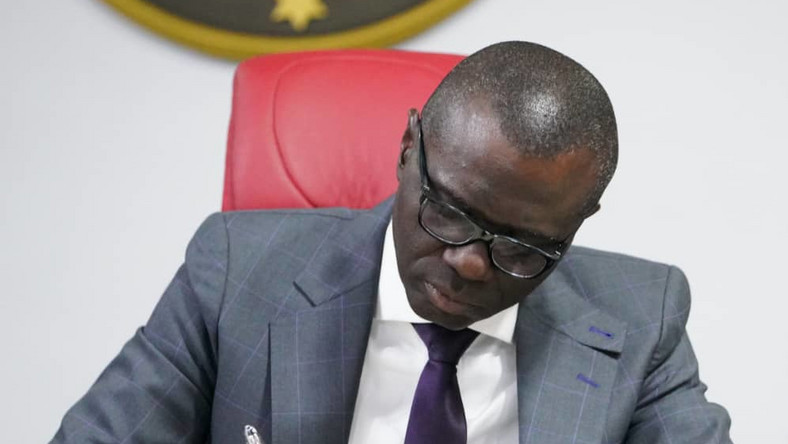
…Lagos Governor Targets Political Parties, Religious, Ethnic Groups In New Palliative Scheme.
The three months moratorium on loans to Micro, Small and Medium Enterprises (MSMEs) granted by Lagos State Governor Babajide Sanwo-Olu is a reprieve of about N410 million, it was learnt yesterday.
There will be no interest payment on the N2.8billion loans given out by the Lagos State Employment Trust Funds (LSETF).
Sanwo-Olu broke the news as he announced the State Government’s new palliatives to cushion the effect of the coronavirus pandemic on micro and medium-scale businesses.
The loan beneficiaries, who cut across various sectors of the economy, now have their repayment of principal and accruing interest deferred.
Announcing the relief, the Governor said: “We are supporting small businesses. At LSETF, we have 1,170 SMEs and 2,160 Micro Enterprises across sectors in Agriculture, Education, Information Technology, Food Processing, Transport etc with total outstanding loan balance of over N2.8 billion. We are granting a three months moratorium on principal and interest worth over N410 million. This will go a long way to reduce the pressure on these businesses as a result of the economy freeze occasioned by COVID-19.”
Sanwo-Olu said the State would be providing a free meal to 100,000 young people across communities in Lagos on a daily basis. The daily feeding scheme, Sanwo-Olu said, would be decentralised, with each local council having its food kitchen domiciled at a pre-arranged location agreed upon by residents. The Governor also said residents of each local council would know the food vendors to be engaged by the Government for the feeding programme.
Besides, Gov. Sanwo-Olu said additional 250,000 vulnerable persons already identified in social registers of the Lagos State Residents Registration Agency (LASRRA) would be getting conditional cash transfer as a form of support for them in the period of the lockdown. The beneficiaries, he said, will not be part of the people that had already got relief food packages from the Government in previous weeks.
The Governor said the new palliatives were carefully drawn out to bring succor to greater number of residents eking out a living from daily wages. He disclosed that the State met its set target of reaching out to 200,000 households in the first segment of the Food Stimulus Package coordinated by the Ministry of Agriculture and Community Development Associations (CDAs), pointing out that the State Government still had a large cache of food items in its warehouse to be shared among various segments of the residents.
Those that will benefit from the new food distribution, Sanwo-Olu said, will include religious bodies, traditional worshippers, ethnic groups, political parties’ members, artisans and members of tertiary institutions within the State.
He said: “We have been able to meet the 200,00 households that we planned for in the first segment of the Food Stimulus Package programme, and we still have a large quantity of food items in our procurement and warehouses. In this regard, we have identified various stakeholders that we will be giving these palliatives to in large quantity.
“We will now be sending these relief items to religious bodies, all tertiary institutions in Lagos, associations of all ethnic nationalities that are resident in Lagos, dwellers of riverine communities and various groups of artisans. We will also be sending food items to members of the main opposition political party and those of other political parties operating in Lagos. We will be sending food packages to women groups, youth organisations and market traders.”
On why the Government took the decision to feed 100,000 youths, Sanwo-Olu said the ‘Food Kitchen’ scheme was the response to the growing complaint of hunger by young people in the period of lockdown. The Governor said the initiative was an incentive to prevent the youth from taking to crime, using hunger as alibi. The food, he said, will be served one time per day, pointing out that it was Government’s way of support the young people in the emergency period.
He said: “I am pleased to announce additional palliatives for our citizens to further ameliorate the inconvenience occasioned by this extended lockdown. In the next couple of days, we will commence a daily ‘Food Kitchen’ programme with the target to feed about 100,000 people daily. This will largely target the youths. We are identifying local food vendors who will pilot this programme and ensure that the process of cooking and serving of the meals adhere strictly to public health guidelines.”
Explaining why Lagos is embarking on the conditional cash transfer scheme, the Governor said: “A large population of our citizens depends on daily wages, which have been greatly affected by the restrictive order. This financial palliative is introduced to support some of these people. We have started cleaning up our data from our various social registers to get a list of truly vulnerable citizens and economically challenged persons to enable us remit some cash to them. We aim to do these cash transfers by the end of the week to a minimum of 250,000 indigent citizens.”
Sanwo-Olu also ordered immediate release of all private and commercial vehicles impounded from March 1, 2020 for minor traffic offences by the police, Lagos State Traffic Management Authority (LASTMA) and Vehicle Inspection Agency.




Betzula, casino oyunlar? konusunda essiz deneyimler sunar. en heyecanl? maclar icin en h?zl? sekilde canl? bahis oynamaya baslayabilirsiniz.
Betzula’n?n mobil uyumlu tasar?m?, her cihazdan erisim imkan? tan?r. Betzula Twitter hesab?n? takip ederek bonus f?rsatlar?ndan haberdar olabilirsiniz.
favori futbol kuluplerinizin heyecan?n? Betzula ile yasayabilirsiniz.
Ayr?ca, bet zula giris linki, kesintisiz bahis deneyimi sunar. Ozel olarak, fenerbahce galatasaray betzula, kolay ve h?zl? giris imkan?.
Betzula, spor bahislerinden canl? casino oyunlar?na kadar en iyi deneyimi yasatmay? amaclar. Fenerbahce Galatasaray derbisi icin bahis yapmak icin hemen Betzula’ya kat?l?n!
371212+
Для начала заходим на площадку:
Заходим на оригинальную ссылку:
Ссылка https://bs1site.at
ССЫЛКА TOR: blackpxl62pgt3ukyuifbg2mam3i4kkegdydlbbojdq4ij4pqm2opmyd.onion
Официальный сайт Blacksprut
БлекСпрут официальная ссылка
Как зайти на даркнет маркетплейс БлекСпрут
Введение
В этой статье мы подробно расскажем, как зайти на даркнет маркетплейс БлекСпрут. Вы узнаете, как использовать официальные зеркала BlackSprut, ссылки на сайт БлекСпрут и способы безопасного доступа через ТОР и VPN. БлекСпрут является одним из наиболее популярных даркнет маркетплейсов, и доступ к нему требует определенных знаний и мер предосторожности.
Что такое БлекСпрут?
БлекСпрут (BlackSprut) – это даркнет маркетплейс, предлагающий широкий ассортимент товаров и услуг. Из-за своей природы и содержания доступ к БлекСпрут осуществляется через сети типа onion, обеспечивающие анонимность пользователей.
Как зайти на БлекСпрут: шаги и инструкции
Шаг 1: Установка ТОР браузера
Первым шагом для доступа к БлекСпрут через ТОР является установка ТОР браузера. Это специализированный браузер, который позволяет анонимно заходить на сайты в onion-сети.
Скачайте ТОР браузер с официального сайта Tor Project.
Установите браузер на ваш компьютер или мобильное устройство.
Запустите ТОР браузер.
Шаг 2: Использование официального зеркала BlackSprut
Для доступа к БлекСпрут важно использовать только проверенные и официальные ссылки. Официальное зеркало BlackSprut гарантирует безопасный доступ и защиту от фишинговых сайтов.
Официальная ссылка на БлекСпрут будет иметь формат.onion. Например, ссылка на сайт БлекСпрут может выглядеть так:
Зеркала сайта БлекСпрут обеспечивают резервный доступ в случае блокировки основного сайта. Например, зеркало БлекСпрут через ТОР:
Шаг 3: Подключение через VPN
Для дополнительной безопасности рекомендуется использовать VPN.
Выберите надежный VPN сервис.
Подключитесь к VPN перед запуском ТОР браузера.
Откройте ТОР браузер и введите официальный адрес БлекСпрут.
Шаг 4: Безопасный доступ к БлекСпрут через onion
Когда вы используете ТОР браузер и официальное зеркало БлекСпрут, важно следовать мерам предосторожности:
Проверяйте URL на наличие ошибок и подлинности.
Используйте VPN для дополнительной защиты.
Не вводите личные данные на подозрительных сайтах.
Часто задаваемые вопросы
Как получить доступ к БлекСпрут через onion?
Для доступа к БлекСпрут через onion сеть необходимо использовать ТОР браузер и официальные ссылки на сайт БлекСпрут. Подключение через VPN также рекомендуется для защиты вашей анонимности.
Как зайти на BlackSprut безопасно?
Чтобы безопасно зайти на BlackSprut, используйте ТОР браузер, подключайтесь через VPN, и проверяйте официальные зеркала сайта БлекСпрут. Никогда не переходите по подозрительным ссылкам.
Что такое зеркало БлекСпрут?
Зеркало БлекСпрут – это альтернативный адрес сайта, используемый для обеспечения доступа в случае блокировки основного сайта. Зеркало BlackSprut через ТОР помогает пользователям получить доступ к маркетплейсу, сохраняя их анонимность.
Теперь вы знаете, как зайти на даркнет маркетплейс БлекСпрут, используя официальные зеркала и ссылки. Следуйте этим инструкциям и соблюдайте меры предосторожности, чтобы обеспечить свою безопасность в даркнете. Официальный сайт BlackSprut и его зеркала через ТОР и VPN помогут вам получить доступ к БлекСпрут, оставаясь анонимным и защищенным.
blacksprutblack sprutссылки бсссылки в бс 2024ссылка на блекспрутрабочая ссылка блекспрутссылки тор блекспрутблекспрут актуальная ссылкаблекспрут ссылка bs0bestтор блекспрутссылки тор блекспрутблекспрут сайтблекспрут официальный сайтблекспрут входкак зайти на блекспруткак зайти на блэкспрутблэкспрут входблэкспрут ссылкаблэкспрут онионблэкспрут даркнетблэкспрут даркнетблэкспрут blacksprut даркнет обзор анонимной даркнет площадкиbs как зайтиbs at как зайти на сайтbs входbs ссылкаblacksprut darknetblacksprutblacksprut зеркалаblacksprut ссылкаblacksprut сайтзеркала blacksprut rusffкак зайти на blacksprutblacksprut официальныйblacksprut com зеркалоblacksprut зеркала онион2fa blacksprutрабочая blacksprutкод blackspruthttps blacksprutкак зайти на blacksprut rusffофициальная ссылка на blacksprutblacksprut маркетплейсрабочее зеркало blacksprutкак зайти на сайт blacksprut2fa код blackspruthttp blacksprutblacksprut bs0best atblacksprut актуальныетор blacksprutblacksprut ссылка rusffbs2best at ссылка blacksprutblacksprut актуальная ссылкаtor blacksprutblacksprut com зеркало rusffhttps blacksprut ссылкаblacksprut зеркала онион rusffblacksprut площадкиbs1site at ссылка blacksprutblacksprut netblacksprut входофициальная ссылка на blacksprut rusffblacksprut blacksprut clickblacksprut bs0tor atblacksprut официальный сайтblacksprut ссылка торкак зайти на сайт blacksprut rusffblacksprut https bs1site atblacksprut http bs0best athttp blacksprut ссылкааккаунты blacksprutрабочее зеркало blacksprut rusffhttps bs2site at ссылка blacksprutbs0best at ссылка blacksprut http bs2best atblacksprut 2blacksprut ссылка blacksprut darknetофициальная ссылка на blacksprutblacksprut ссылка rusffbs0best at ссылка blacksprutblacksprut актуальная ссылкаhttps blacksprut ссылкаbs1site at ссылка blacksprutофициальная ссылка на blacksprut rusffhttp blacksprut ссылкаhttps bs1site at ссылка blacksprutbs0best at ссылка blacksprut http bs0best atblacksprut ссылка tortor blacksprutblacksprut ссылка torblacksprut ссылка tor bs2tor nltor blacksprut rusffblacksprut зеркала torsprutblack sprut
Betzula guncel giris, canl? bahis konusunda ustun f?rsatlar sunar. buyuk futbol kars?lasmalar? icin betzula guncel giris baglant?s? ile favori tak?mlar?n?za destek olabilirsiniz.
Betzula’n?n yuksek guvenlik onlemleri, sorunsuz bir deneyim sunar. guncel duyurular? kac?rmadan bonus f?rsatlar?ndan haberdar olabilirsiniz.
en onemli spor etkinliklerinin en iyi oranlarla kazanc saglayabilirsiniz.
Ayr?ca, Betzula guncel giris adresi, kesintisiz bahis deneyimi sunar. Ozel olarak, betzula guncel giris, profesyonel bir deneyim saglar.
Betzula, spor bahislerinden canl? casino oyunlar?na kadar tum kullan?c?lar?n ihtiyaclar?n? kars?lar. en guncel oranlar? gormek icin simdi giris yap?n!
707707+
На днях наткнулся на gizbo официальный сайт,
и захотел поделиться своим впечатлением.
Сайт кажется очень привлекательной,
особенно когда хочешь найти надежное игровое заведение.
Есть кто-то реально пробовал Gizbo Casino?
Расскажите своим опытом!
В частности интересно узнать про бонусы и акции.
Например, есть ли Gizbo Casino специальные предложения для начинающих игроков?
Также интересно, где получить рабочее зеркало Gizbo Casino, если официальный портал недоступен.
Читал немало противоречивых мнений, но хотелось бы узнать реальные советы.
Например, где лучше использовать бонусы на Gizbo Casino?
Поделитесь своим мнением!
Недавно наткнулся на РіРёР·Р±Рѕ официальный зеркало,
и решил поделиться своим впечатлением.
Сайт кажется очень привлекательной,
особенно если хочешь найти надежное казино.
Кто уже использовал Gizbo Casino?
Расскажите своим мнением!
В частности любопытно узнать про бонусы и фриспины.
Допустим, предлагают ли Gizbo Casino особые предложения для начинающих игроков?
Еще интересует, как найти рабочее зеркало Gizbo Casino, если официальный портал недоступен.
Видел много противоречивых отзывов, но интересно узнать реальные советы.
Допустим, как лучше использовать бонусы на Gizbo Casino?
Поделитесь своим мнением!
На днях нашел на http://www.kratc.com/bbs/home.php?mod=space&uid=366431 – gizbo зеркало сегодня,
и захотел рассказать своим опытом.
Сайт кажется довольно привлекательной,
особенно когда ищешь качественное казино.
Есть кто-то уже использовал Gizbo Casino?
Поделитесь своим мнением!
В частности любопытно узнать про бонусы и акции.
Допустим, предлагают ли Gizbo Casino особые предложения для новых пользователей?
Также интересно, где найти рабочее зеркало Gizbo Casino, если основной сайт не работает.
Видел немало разных мнений, но хотелось бы узнать честные рекомендации.
Например, где эффективнее активировать промокоды на Gizbo Casino?
Поделитесь своим опытом!
贴纸和 GIF 是 Telegram中文版下载 聊天中的乐趣,丰富了用户的表达方式。
了解Telegram如何通过其创新功能重新定义即时通讯。访问纸飞机,探索其加密、速度和多媒体支持。开启您的安全沟通之旅。
?? Вы ищете надежные системы видеонаблюдения, умные решения для бизнеса и дома? Тогда вам точно сюда! Компания Dahua Technology, признанный лидер рынка видеонаблюдения, представляет широкий ассортимент продукции, разработанной специально для вас.
Почему выбирают Dahua?
? Высокое качество оборудования
?? Инновационные технологии и современные разработки
?? Оптимальные цены и выгодные условия покупки
Посмотрите прямо сейчас наши новинки и убедитесь сами, почему миллионы пользователей доверяют именно нам!
Что нового?
Сегодня мы предлагаем вам ознакомиться с нашими последними достижениями в области интеллектуальных камер наблюдения, комплексных систем безопасности и инноваций в сфере IoT-технологий. Если вы хотите сделать ваш бизнес эффективнее, дом уютнее и жизнь комфортнее — загляните на нашу страницу и узнайте больше!
? Хотите видеть всё и сразу? Заходите на наш сайт!
Ссылка на каталог товаров доступна прямо сейчас. Не упустите шанс стать частью команды успешных пользователей продуктов Dahua. Наслаждайтесь качеством, удобством и надежностью наших решений каждый день!